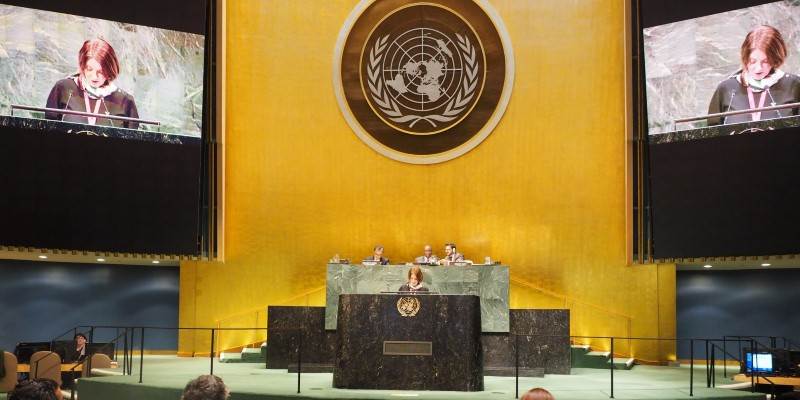Excellencies, Ladies and Gentlemen,
On behalf of the President of the Economic and Social Council, it is my honour to address the 50th Session of the Statistical Commission.
ECOSOC serves as the principal organ to coordinate the economic, social and related work of the United Nations. It oversees several subsidiary bodies, including the Statistical Commission and the Committee of Experts on Global Geospatial Information Management. Functional commissions drive the work of ECOSOC. The Statistical Commission, serves as the hub of the global statistical system. Your work on very important issues, such as the global SDG indicators, is essential to the work of the Council and it informs the deliberation at the annual High-level Political Forum. The decisions you will make over the next few days are vital to the work of ECOSOC. And it is critical that the communication between this body and ECOSOC and the High Level Political Forum, be continuously strengthened.
As the center of discourse on international economic and social issues, ECOSOC has an important role to coordinate and build better linkages across the subsidiary bodies. In this effort, effective coordination is the key. I therefore welcome your efforts to work with the broader ECOSOC family, such as the Commission on the Status of Women, the Commission for Social Development, the Commission on Narcotic Drugs and the Permanent Forum on Indigenous Issues, as well as the High-level meeting of the Development Cooperation Forum.
The President and the Bureau of ECOSOC remain strongly committed to strengthening the role of ECOSOC in guiding the work of its subsidiary bodies to enhance their contribution to implementing the 2030 Agenda. We are also committed to strengthening the role of the functional commissions, including the Statistical Commission, in the work of the United Nations.
By consolidating the links across ECOSOC bodies and forums, data and statistics can better inform the policy discussions. This will lead to more data and statistics used in evidence-based policy making. As countries prepare Voluntary National Reviews (VNRs), strong, sustainable statistical systems provide the foundation for the collection, production and dissemination of this evidence. Official data provided by Member States to the global statistical system will form the basis of the two SDG progress reports, which will be prepared for the 2019 High Level Political Forum (HLPF).
The HLPF is the platform for follow up and review of the implementation of the 2030 Agenda for Sustainable Development at the global level. It is also a platform for peer learning, where countries come together to showcase their successes and challenges faced in the implementation of the 2030 Agenda. This year there are two High-level Political Forums on sustainable development (HLPF). The July HLPF, under the auspices of ECOSOC, will review in-depth SDG 4 on quality education; SDG 8 on economic growth and decent work; SDG 10 on inequalities; SDG 13 on climate action; SDG 16 on peaceful societies and robust institutions; and SDG 17 on the means of implementation. The July HLPF will be guided by the theme: ‘Empowering people and ensuring inclusivity and equality’.
This year, 50 countries will present their Voluntary National Reviews (VNR). Many of those reviews have benefitted from the work of this commission and of you, chief statisticians in countries, where the statistical systems provide the data and statistics that are the necessary foundation for the reviews. The September event is at summit level, under the auspices of the General Assembly. It will focus on ways to accelerate progress towards all the SDGs. Improving the availability and use of data for the full implementation of the agenda is key if we want to see faster progress.
In my own country, Norway, we are acutely aware of the importance of data, statistics and geospatial information for formulation of targeted and inclusive policies for sustainable development. We have a long tradition of using administrative data across economic, social and environmental pillars in order to produce relevant and timely statistics for government, academia, unions, private sector and civil society.
The utilization and improvement of quality in administrative data can respond to the many data needs of the 2030 Agenda and the SDGs. In order to leave no one behind, also the most vulnerable amongst us must be included in the statistics. People who flee from armed conflicts, political instability and the impact or climate change, must therefore be embraced by our joint efforts.
Building strong sustainable statistical systems requires more and better financing for statistics and data. The work of the Statistical Commission’s High-level Group on Partnership, Coordination and Capacity Building and the High-Level Forum on Official Statistics highlight this ongoing dialogue. I call on you and all development partners to scale up efforts in statistical capacity building, while ensuring that efforts are carried out in a sustainable way. Linking resource allocation directly with measurable outputs and focusing on filling the gaps in basic statistics should be our main priorities.
I wish you a successful Commission.
Thank you.
